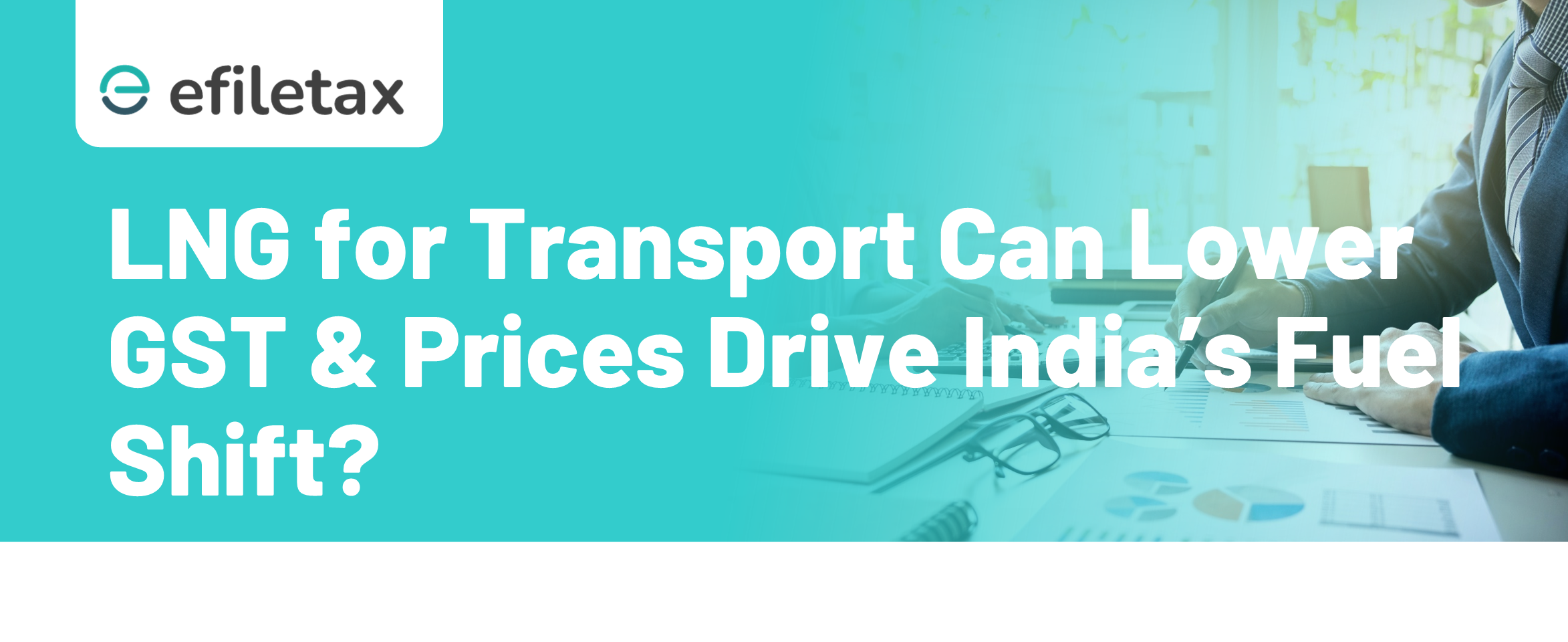
LNG as Transport Fuel Why Lower GST & Prices Are a Must
India’s clean energy goals are pushing for LNG (Liquefied Natural Gas) to become a viable transport fuel. But the road ahead is bumpy—high GST, uneven pricing, and poor infrastructure are slowing down adoption. Industry experts are urging the government to reduce GST on LNG, streamline distribution, and make it economically competitive with diesel and petrol.
Let’s break this down in simple terms.
Current Tax on LNG: The Bottleneck
LNG is currently taxed at 18% GST under HSN Code 2711, while petrol and diesel remain outside GST altogether and are taxed by states. This puts LNG at a price disadvantage, especially when it’s being promoted as a cleaner alternative.
Tax Comparison Table:
| Fuel Type | GST Rate | Outside GST? | Effective Tax Burden |
|---|---|---|---|
| Petrol/Diesel | NIL | Yes | ~45-60% (State VAT + Excise) |
| LNG | 18% | No | 18% GST + Input Blockages |
Key Issues Holding Back LNG Adoption
- High GST Rate (18%): Increases per kg cost, especially for long-haul transporters
- No Uniform Distribution: Limited LNG refuelling stations across highways
- Input Tax Credit Blockage: Transport operators cannot fully claim ITC on LNG infrastructure
- Lack of Fiscal Incentives: No subsidy or tax rebate similar to EV sector
Industry Demands: A Policy Reset
According to industry associations like FICCI and the Federation of LNG Transport, the following steps are crucial:
- Reduce GST on LNG to 5% – similar to biofuels and CNG
- Include natural gas in GST framework – for better ITC flow
- Incentivise LNG trucks and retrofitting kits
- Accelerate approval for LNG stations under PNGRB
Legal and Policy Framework
- GST Law Reference: LNG is classified under Chapter 27 (HSN 2711) with 18% GST as per Notification No. 1/2017-Central Tax (Rate) dated 28.06.2017.
- PNGRB Guidelines: Set norms for licensing LNG retail stations; reforms needed for faster rollout.
- Budget 2023 & 2024: Focused on green hydrogen and EVs, but LNG sector got minimal mention.
Expert View: Cost Parity Is Crucial
“Without bringing LNG under GST and rationalising the tax rate, it’s difficult to make it viable for fleet operators. Cost parity with diesel is non-negotiable.”
— Energy Policy Analyst, Indian Energy Forum
Why It Matters for India
- Cleaner Emissions: LNG emits 20–25% less CO₂ than diesel
- Import Diversification: Reduces crude oil dependence
- Long-Term Cost Saving: For bulk logistics operators once infrastructure matures
Efiletax Insight
Businesses investing in LNG fleets or stations can opt for GST planning strategies and explore eligible ITC claims with proper structuring. Connect with our tax experts for guidance on LNG-related compliance.
👉 Speak to a GST Expert at Efiletax
Summary
Lowering GST on LNG from 18% to 5% and improving infrastructure are critical for making LNG a mainstream transport fuel. Experts stress the need for cost parity and input credit clarity to unlock adoption.
FAQ: LNG as Transport Fuel in India
Q1. What is the GST rate on LNG in India?
A. LNG is taxed at 18% under the GST regime (HSN 2711).
Q2. Is LNG adoption eligible for tax incentives?
A. Currently, no direct subsidy or rebate like EVs. However, business use may offer indirect tax structuring benefits.
Q3. Why is LNG not widely used as a transport fuel yet?
A. High tax, lack of infrastructure, and limited policy focus are key reasons.
Q4. Will GST on LNG be reduced soon?
A. Industry is actively lobbying for it, but no formal notification yet.